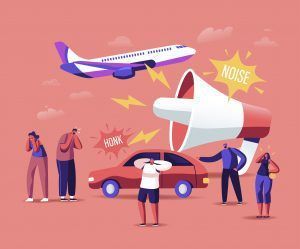Article
Communication Tips for Individuals With Hearing Aids
May 1, 2022
Written By: Kathleen Page, NYS Licensed and Board Certified Audiologist
The effects of hearing loss are not the same for everyone. Many individuals with hearing loss find it difficult to understand speech and distinguish speech from background noise. For the hard-of-hearing person, effective communication is a challenge.
While hearing aids greatly improve the listening experience, some additional cues are helpful to understand speech better in difficult listening environments. Here are some tips to improve communication.
Tips for the hearing aid user — one of the most critical factors for effective communication is YOU!
- Make sure your hearing aids are working properly and cleaned/serviced regularly.
- If you are prone to earwax, schedule a visit with your ENT to manage it at least twice a year.
- Be open with people about your hearing loss.
- Ask people to get your attention and face you when they speak.
- Ask others to speak clearly and naturally—and not to shout. Shouting changes how words sound.
- Minimize background noise. Turn off the TV, or move to a quieter location or away from the noise.
- Be within 3 or 4 feet of the person talking; it will be easier to hear them and to watch their lips.
- Turn your back to bright light so that the person talking to you will face it. It will be easier to read lips and facial cues if the speaker’s face is illuminated and the light is not in your eyes.
- If you don’t understand the first time, ask the speaker to repeat, speak more slowly or rephrase.
- If your hearing is not the same in both ears, turn your better ear toward the speaker.
- If you are listening intently for a while, you may feel tired. Take a break.
- In difficult listening situations, wireless communication solutions like a table mic or partner clip-on mic can help overcome background noise.
- Consider joining a lip-reading course locally or online (e.g., org) to hone your skills.
- Don’t be too hard on yourself. Nobody hears correctly all of the time.
Tips for the communication partner —how we speak can make communication easier or more difficult.
- Be sure to get the individual’s attention before you start speaking.
- Make sure your partner can see your face, and keep your hands away from your face while talking.
- Reduce the distance between you and the listener, especially in background noise.
- DON’T SHOUT! Maintain a normal tone of voice and speak clearly. Shouting will cause discomfort and sound distortion.
- Speak more slowly, but do not speak in “slow-motion” or over-enunciate. Interject pauses to give the listener time to digest what you have said.
- Keep statements simple. Emphasize key words or phrases.
- Repeat yourself. If the listener continues to have trouble, rephrase the sentence.
- Don’t speak while chewing, eating or smoking—your speech will be more difficult to understand.
- Don’t expect the person with hearing loss to hear you from another room!
- Adjust lighting so that your face is illuminated, allowing the listener to watch your lips more easily.
- Reduce background noise when carrying on conversations. Turn off the TV or radio, or move away from the noise source.
- When dining out, request a booth or table near the wall and away from high traffic areas. If people are talking and the individual seems lost, fill them in with a few explanatory words.
- Recognize that hard-of-hearing people hear and understand less when they are tired or ill.
- Ask the hard-of-hearing person what you might do to make conversation easier for them.
share this
Related Articles
Related Articles

It’s tax time again … and who doesn’t like to get a tax break? If you have hearing loss, you may qualify for special tax deductions for hearing-care-related expenses that can help reduce your overall tax burden – and keep more money in your pocket. Enlisting the help of an accountant is always a good idea, but here’s some general information about the IRS tax deductions that everyone with hearing loss should be aware of. How Much Can I Claim? If you itemize deductions instead of using the standard deduction, you can claim uninsured medical costs, including those pertaining to hearing health care , as a tax-deductible expense. However, your overall uninsured medical expenses must collectively total more than 7.5% of your adjusted gross income (AGI) for you to claim them as an itemized deduction . For example, if your AGI is $40,000, you may deduct the cost of any qualifying medical expenses over $3,000. Since hearing devices can cost thousands of dollars and often are not covered by insurance, it’s easy to see how medical expenses can add up fast. What Expenses Can I Claim as a Deduction? Uninsured hearing health costs you can claim as a medical expense include payments for: · Hearing aids, batteries, repairs and maintenance · Telephone equipment, including captioned phones, phones with special ringers and teleprinters, as well as their repair costs · TVs and related accessories that provide captioning and amplify sound, as well as repair costs · Improvements to your home for special burglar alarms, smoke detectors and doorbells · Assistive devices such as TV streamers, remote mics, bed shakers, and sound machines for tinnitus relief · Transportation to and from hearing health appointments · Hearing Guide dog expenses, such as grooming, food costs and veterinary costs Remember to keep the receipts for all related expenses—you’ll need them handy when it’s time to claim them on your taxes. Are Hearing Device Donations Tax Deductible? The answer is … Yes! If you itemize deductions on your tax return, you can claim a deduction for any hearing device donations. Only donations made during the previous tax year are eligible for the tax benefit, and you may only deduct the fair market value. To determine the fair market value, use a five-year, straight-line depreciation formula: Divide the original price of the devices by five to determine the annual depreciation. Multiply the annual depreciation by the age of the devices. Subtract that figure from the original price to determine the remaining value. Help Your Hearing and Your Budget Hearing better is priceless—it can enhance your communication skills, improve your relationships and allow you to rediscover your zest for life. If you or someone you love has been struggling to hear, don’t put off getting help for any reason—financial or otherwise. H.E.A.R.S. Audiology offers deep discounts on several premium tech hearing aid models, and we will work with you to find the best solution that fits within your budget. For those with no insurance coverage for hearing aids, our discounted pricing combined with the permitted tax deductions can make your hearing health care costs more manageable. Schedule a hearing evaluation today and begin your journey to better hearing.

Written By: Kathleen Page, NYS Licensed and Board Certified Audiologist Life seems easier in summer. The warmer months give us time to kick back, relax and have fun. But when the temperature rises, so do the number of noisy activities that could damage your hearing. No worries … by knowing the risks and protecting your…
Written By: Kathleen Page, NYS Licensed and Board Certified Audiologist Hearing loss is the third most common health problem among older adults in the U.S., after heart disease and arthritis. In honor of Better Hearing & Speech Month, let’s address a few of the many misconceptions around hearing loss. Myth #1 Exposed: The…
STAY UP TO DATE
GET PATH'S LATEST
Receive bi-weekly updates from the church, and get a heads up on upcoming events.
Contact Us


